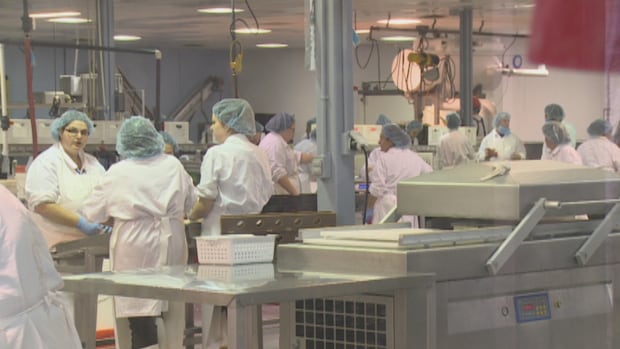Hundreds of temporary foreign workers in P.E.I.’s seafood processing sector have seen their hours cut or faced layoffs this year after China imposed tariffs on Canadian seafood, says a group that supports the workers.
In March, China introduced a 25 per cent tariff on Canadian seafood in retaliation for levies Canada introduced on Chinese-made steel, aluminum and electric vehicles.
The P.E.I. Seafood Processors Association said it’s just one of the factors leading to slowdowns at many processing facilities on the Island.
Ryan MacRae is a program co-ordinator with the Cooper Institute, a Charlottetown-based organization that advocates for migrant workers on P.E.I. He said he is aware of more than 200 seafood processing workers affected by the lack of work at the plants.
But he said the situation highlights a deeper problem: the structure of Canada’s temporary foreign worker program, which ties workers to a single employer through closed work permits.
They still have to pay rent, they still have to get groceries, they still have to pay bills.— Ryan MacRae, Cooper Institute
“When production is halted or greatly limited, workers are stuck in a really difficult and unfair situation where they actually can’t work anywhere else,” MacRae told CBC News.
“They still have to pay rent, they still have to get groceries, they still have to pay bills, and a lot of them have to help their families back home. Really hard to do that when you’re not earning an income or you’re only working 10 hours a week at minimum wage.”
Canada’s seafood-processing sector is still dealing with China’s new tariffs. And as CBC’s Sheehan Desjardins reports, the impact is trickling down to temporary foreign workers on P.E.I.
Challenges facing P.E.I.’s seafood processing industry
Seafood processing on the Island relies heavily on migrant labour.
A decade ago, 140 people held work permits under the temporary foreign worker program for jobs related to seafood processing and in seafood plants on P.E.I., according to Statistics Canada. By the end of 2024, that number had grown nearly sixfold, to 780.
Bob Creed, executive director of the P.E.I. Seafood Processors Association, said the association can’t comment on any one situation since it is not involved in the day-to-day operations of its plants.
He did say that several factors are affecting the industry this year.

“Seafood processing can be a challenging and often an unpredictable industry when it comes to weather, raw product supply, market forces and geopolitical tensions,” Creed told CBC News in an emailed statement.
He noted that lobster landings have varied across P.E.I. due to weather and normal fluctuations, landings in Maine are slow this summer, and extremely warm temperatures created challenges for the Island’s shellfish products.
Meanwhile, the oyster industry is grappling with diseases: MSX was discovered in Bedeque Bay last year, while the first P.E.I. case of dermo was reported this year. Oysters with the diseases are still edible, but mortality rates are high so fewer are landed.
“Sometimes slowdowns can lead to temporary layoff periods for our workforce, but hopefully things will pick up for those impacted and more work will become available,” Creed said.
In cases of prolonged layoffs, Creed said some employers may offer to fly workers back to their home country if the worker chooses.
‘Getting worse and worse’
Cardigan MP Kent MacDonald, whose riding includes several major seafood plants, said his constituents have raised concerns that climate change has led to more uncertainty in P.E.I.’s seafood industry.
“When international tariffs are added on top of these environmental stresses, it can make markets more unpredictable and harder to plan for,” MacDonald said in a statement.
Prime Minister Mark Carney said the temporary foreign worker program has a role, but the government is reviewing it along with the immigration system as a whole. Conservative Leader Pierre Poilievre called for the government to scrap the program on Wednesday.
The issue extends beyond P.E.I. Karen Cocq, co-executive director of the Migrant Workers Alliance for Change, said the organization has heard similar stories from workers across Atlantic Canada.
“It’s been getting worse and worse every year,” she said.
Workers face tough choices
MacRae said workers who came to P.E.I. expecting steady employment through the fall are seeing their hours slashed or are being laid off as early as July, despite their closed work permits remaining valid.
The Cooper Institute has been helping some of them explore options such as pursuing open work permits or applying for employment insurance.
But MacRae said those processes are long, complex — and sometimes unsuccessful.
“We’ve heard from workers in the past that in situations like this, sometimes people result to taking out loans, getting family back home selling assets to keep them… afloat here,” he said.
“It’s hard.”
Barriers to changing jobs
There is, however, a fairly new pathway for migrant workers to change jobs. That’s according to Employment and Social Development Canada, which regulates the temporary foreign worker program.

In a statement, the department pointed to Immigration, Refugees and Citizenship Canada’s Changing Employer Public Policy, introduced in May 2020.
“IRCC’s Changing Employer Public Policy helps temporary foreign workers on employer-specific permits change jobs more easily,” the statement said. “Workers already in Canada who have a new job offer under the TFW Program or International Mobility Program can start working while their new work permit application is being processed.”
But MacRae said the real challenge is obtaining that new job, given that workers can’t simply get an offer from any employer. The employer must have a Labour Market Impact Assessment (LMIA) in place.
Finding an LMIA is incredibly difficult, which is why many workers report having to pay illegal fees to a recruiter to obtain one.— Ryan MacRae, Cooper Institute
LMIAs are documents employers need to obtain from the federal government in order to hire temporary foreign workers.
Employers have to prove they can’t find a Canadian citizen or permanent resident to fill the position, and must pay $1,000 for each position requested.
“Employers aren’t going to pay $1,000 unless they actually already have a person in mind that they’re going to hire,” MacRae said.
He added that for workers, finding a legitimate employer with an approved LMIA is challenging.
While Canadian immigration laws prohibit prospective employers, immigration consultants and recruiters from charging workers who want to be hired under an LMIA, CBC News has reported that many workers have been asked to pay for — or were promised — LMIA jobs in exchange for large sums of money.
“Finding an LMIA is incredibly difficult, which is why many workers report having to pay illegal fees to a recruiter to obtain one,” MacRae said in a statement to CBC News.
Calls for change
Prime Minister Mark Carney recently announced an $80-million tariff-relief fund for small and medium-sized businesses in Atlantic Canada, part of a larger $1-billion pot for Canadian businesses affected by American tariffs. Carney said there could be potential applications from the seafood industry.
“Yet, you know, in that package, I didn’t hear anything for support for workers, none whatsoever,” MacRae said.
He said the long-term solution is to grant permanent residency to migrant workers — or at least open work permits so they can freely work for any employer.
“When we have a class of people with permanent residency and citizenship, they can enforce their rights,” he said. “Those with temporary status… with closed work permits, it makes it really, really hard for them to enforce their rights.”








